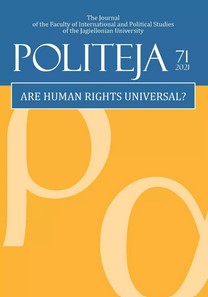EXPLOITATION OF THE RIGHT TO FREEDOM OF EXPRESSION FOR PROMOTING PRO-RUSSIAN PROPAGANDA IN HYBRID WAR
EXPLOITATION OF THE RIGHT TO FREEDOM OF EXPRESSION FOR PROMOTING PRO-RUSSIAN PROPAGANDA IN HYBRID WAR
Author(s): Mykola PolovyiSubject(s): Human Rights and Humanitarian Law, International relations/trade, Politics and communication, Studies in violence and power, ICT Information and Communications Technologies, Peace and Conflict Studies
Published by: KSIĘGARNIA AKADEMICKA Sp. z o.o.
Keywords: right to freedom of expression; pro-Russian propaganda; hybrid war; monitoring of social networks; Facebook; Ukraine;
Summary/Abstract: The paper is devoted to the process and results of an analysis of abusing the right to freedom of expression for promoting pro-Russian propaganda in hybrid war against Ukraine at the present stage. It is shown that due to the peculiarities of the political situation in modern Ukraine, pro-Russian propaganda is most common in social networks. The study is conducted on the data from a weekly monitoring of pro-Russian propaganda in the Facebook public groups (‘publics’) of the Odessa region of Ukraine. Effective typology of propaganda messages in social networks is created and described. Its connection with the Lasswell’s test is grounded. General characteristics of pro-Russian propaganda promotion under the guise of implementing the right to freedom of expression in the Facebook publics of the Odessa region in the first quarter of 2021 are described. It has been found that the common tone of contemporary pro-Russian propaganda in Ukraine is becoming increasingly ‘soft’. The main group of contemporary pro-Russian propaganda messages are about the ‘shared past’ of Ukraine and Russia during the Soviet era, shared nostalgia for the ‘brave past world.’ ‘Soft’ promotion of the Russian information agenda and indicating Russian or Ukrainian pro-Russian media as a familiar source of information is the second huge group of propaganda texts. It is noted that both most popular ‘patterns’ of the propaganda can be considered propaganda only in the context of Russia’s undeclared war against Ukraine.
Journal: Politeja - Pismo Wydziału Studiów Międzynarodowych i Politycznych Uniwersytetu Jagiellońskiego
- Issue Year: 18/2021
- Issue No: 71
- Page Range: 171-182
- Page Count: 12
- Language: English

